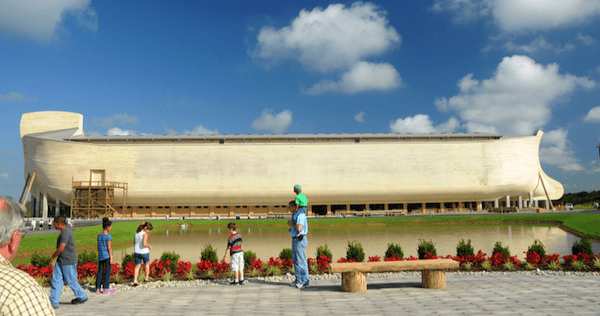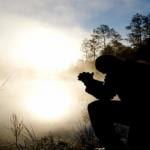By Mark Alsip
A Kentucky public college has used scholarship funds to finance a field trip to two religious theme parks in that state. Ken Ham, the president of the parks’ parent organization, Answers in Genesis (AIG), has expressed hope that the resulting controversy will trigger a Supreme Court battle. Ham has offered free admission to entice schools to visit and suggested that pro bono legal help is available for those willing to “taking the lawsuit.”

In June 2018, Southeast Kentucky Community Technical College (SKCTC) took a field trip that included stops at the AIG-run Ark Encounter and Creation Museum. In attendance were middle and high school students participating in a school sponsored Scholars Program.
The non-secular nature of the field trip was criticized by sources such as the National Center for Science Education (NCSE), the Kentucky ACLU, the Freedom from Religion Foundation (FFRF), and Daniel Phelps, a professional geologist and president of the Kentucky Paleontological Society.
In an October 2018 Lexington Herald Leader op-ed, Mr. Phelps criticized the pseudoscientific nature of the AIG exhibits. Mr. Ham of AIG took to YouTube in response, linking Mr. Phelps’ op-ed to an alleged attempt by “atheists” to disparage his attractions. He encouraged public schools to organize trips to his parks and “take the lawsuit,” saying, “we have Christian groups, attorney groups, who are willing to defend them at no cost, and take it all the way to the Supreme Court, because we need the Supreme Court to rule on this.”
A few weeks later, when atheists announced an Easter 2019 conference in Cincinnati, OH, Mr. Ham saw the gathering as yet another attack on his parks. In an open letter, he again lashed out at “aggressive atheists,” writing, “we are working on a way to see if we can help public schools have students visit the Ark. More on this effort will be announced later.”
The FFRF responded with a January 8, 2019 memorandum to all Kentucky public schools, warning of the constitutional dangers of such visits.
Mr. Ham quickly fired back. On the same day, he offered free admission to schools that received the Freedom from Religion Foundation warning, and again dangled the carrot of free legal help, saying “if the FFRF dares threaten or bully a public school, we have access to expert constitutional law attorneys who will provide their services to the school, pro bono, even if that means going all the way to the US Supreme Court.”
Amid growing concerns over how “religious liberties” cases might play out before the recently-cemented conservative majority on the U.S. Supreme Court, this could be a troubling development.
In the Beginning
According to an article in the Middlesboro Daily News, the SKCTC trip was part of a summer Scholars Program led by Dr. Carolyn Sundy and included on-campus science studies in addition to visits to secular attractions in Kentucky and Ohio. Dr. Sundy did not respond to interview requests, but Amy Simpson, SKCTC’s Director of Public Relations and Publications, agreed to speak on behalf of the college.
Ms. Simpson challenged the assertion that the trip was religious in nature, referring to it instead as a “cultural enrichment experience.”
“We live in an economically deprived area, one that is challenged by job loss, a declining coal industry, and an opioid epidemic,” said Ms. Simpson. “The vast majority of these students have never travelled out of Harlan County. Students also visited the [Newport] Aquarium, the [Cincinnati] Zoo, Kings Island, and the Cincinnati Reds Hall of Fame. The Ark Encounter and Creation Museum was but one stop along the way.”
However, that “one stop along the way” may have been a serious breach of the Establishment Clause of the First Amendment to the Constitution, which does not permit a state-financed institution (e.g., a school) to promote a particular religious viewpoint.
“Given that Answers in Genesis is quite forthright about the fact that its attractions exist in order to promote a specific set of religious beliefs, I think that there’s a good case to be made that the Establishment Clause was indeed violated,” says Glenn Branch, Deputy Director of the NCSE.
Answers in Genesis, does, for its part, unapologetically defines its mission as one of proselytization, being “dedicated to enabling Christians to defend their faith and [proclaiming] the gospel of Jesus Christ.”
In a January 2019 blog post titled “Great Gospel Impact at the Ark Encounter,” Ken Ham tells the story of three children whose visits to the Ark Encounter and Creation Museum “soon turned into an admission that they had been provided the answers they needed,” and “that night, all three received Christ as their Savior.”
Ann Reid, NCSE’s Executive Director, noted in a letter to SKCTC’s Dr. Sundy, “I can fully appreciate it if you were under the impression that Answers in Genesis’s attractions were innocuous, comparable to Kings Island and the Cincinnati Reds Hall of Fame. They are designed to appear that way. But it would be a bad mistake…”
One need not search far to justify Ms. Reid’s caution to Dr. Sundy. Children entering the Ark are immediately confronted by a warning from Satan, telling them that their souls are at risk if they don’t believe in a global flood. Another exhibit informs them that, because they’re sinners, they deserve to die.
How such overtly menacing displays qualify as “world class scientific exhibits” (as per Ham), is anyone’s guess. But to say the exhibits don’t run afoul of the Establishment Clause’s prohibitions would be difficult indeed.
“We remind teachers and state officials that religious education is best left to parents and churches, not school or government,” says Heather Gatnarek, Staff Attorney of the Kentucky ACLU.
Asked whether her college allowed the use of scholarship funds for religious activities, Ms. Simpson replied, “according to KCTCS [Kentucky Community Technical College System] legal counsel, there is no legal precedent that suggests a public higher education institution can have no interaction with or exposure to anything of a religious nature.” She also stated that the scholarship account was privately funded.
To critics, however, the source of the scholarship funds is not the issue. Rather, it’s government-funded schools visiting attractions that promote a singular religious viewpoint.
Science, by Any Other Name
These same critics also took aim at the “science” in AIG science exhibits.
In a September press release, Kentucky Paleontological Society president Daniel Phelps wrote “the exhibits at the Ark and Creation Museum are scientifically unsound and go against the idea of preparing high school students for college-level work. The brand of creationism promoted by these attractions, among other things, claims the earth and universe are only 6,000 to 10,000 years old, that humans coexisted with dinosaurs.”
In a letter to Dr. Sundy, Ann Reid, Executive Director of the NCSE, cited objections to the AIG teachings including, “Noah’s Flood was a historic event responsible for the bulk of the fossil record and the existence of geological features like the Grand Canyon, and that evolution is impossible except within the ‘kinds’ mentioned in the Bible.”
“None of these beliefs have any scientific credibility whatsoever, and insofar as the Scholars program leads students to think otherwise, it will hinder their ability to flourish in higher education,” continued Ms. Reid.
When presented with the scientific community’s objections to the Ark Encounter, Ms. Simpson replied, “As an institution of higher learning, SKCTC encourages discourse and debate. We do not proselytize, neither do we censor ideas. We look instead to provide students with as much information as possible so that they are well equipped to think for themselves.”
However, Heather Gatnarek, KY ACLU Staff Attorney, countered: “Creationism or Intelligent Design, as presented at the Creation Museum and Ark Encounter, is not a scientific theory, and every court that has considered whether Creationism or Intelligent Design may be incorporated into a public school’s science curriculum has found they cannot.”
When asked whether Scholars Program students were warned that AIG exhibits did not represent scientific theory, Ms. Simpson declined to comment.
Euphemisms, Outside Forces
SKCTC frequently used the phrase “cultural enrichment” to describe its field trip. Is this just another euphemism for teaching religion in public schools? It would join “biblical literacy” classes, which debuted in 2017 when Governor Matt Bevin (R-KY) signed a law legalizing Bible study in Kentucky’s classrooms.
Ostensibly created to teach students how the Bible shaped American history, the literacy classes have at times been found to be something entirely different.
For example, an ACLU investigation found that Letcher County, KY (which sent students on the SKCTC field trip) used actual Sunday School lessons for its biblical literacy curriculum. Students were also required to memorize Bible verses. In an August 2018 press release, the ACLU states that these are “practices which fall far short of constitutionally-permissive academic and objective study of the Bible and its historical context or literary value.”
In October 2018, Governor Bevin used his official government Twitter account to encourage students to participate in “Bring Your Bible to School Day,” an event sponsored in part by the Alliance Defending Freedom (ADF). The ADF, a group of over 3,000 attorneys, boasts of donating over one million pro bono hours defending religious freedom cases, some before the Supreme Court.
Although Ken Ham doesn’t specifically mention the ADF when hinting that free help is available to schools that visit the Ark, it doesn’t escape notice that the ADF and Answers in Genesis already have a working relationship. The ADF recently represented an AIG employee who sued the National Park Service over the right to collect rock samples in the Grand Canyon.
An additional AIG legal ally is the Center for Religious Expression (CRE), a non-profit offering free First Amendment legal representation to Christians. On January 10, 2019, CRE sent a letter to Kentucky schools who previously received the Freedom from Religion Foundation warning. Though stopping short of confirming availability of a pro bono defense, the CRE wrote “We staunchly support your right to visit these attractions if you so choose and encourage you to do so.”
The myriad forces working to put state-sponsored religion back on the menu in Kentucky schools have significant political, financial and legal backing. Euphemisms such as “cultural enrichment” and “biblical literacy” have allowed them to get a foot in the door. A prominent court case could see that door swung wide open.
The Future
SKCTC’s Ark Encounter trip was not the first instance of a public school visiting an AIG attraction. If Ken Ham has his way, it won’t be the last.
With civil rights advocates expressing fear over what might happen when religious-themed cases appear before the conservative majority Supreme Court, the state of Kentucky, famous for bourbon, college basketball, and Thoroughbred horses, may ignominiously become better known for setting the precedent for legalized proselytizing in public schools.
Or, because AIG and its allies have not promised free legal help (only hinted at the prospect), one or more public schools, already struggling financially, may visit the Ark, “take the lawsuit,” and then find themselves abandoned, burdened with the costs of expensive Establishment Clause litigation.
Either way, it would all begin with a school field trip.
















